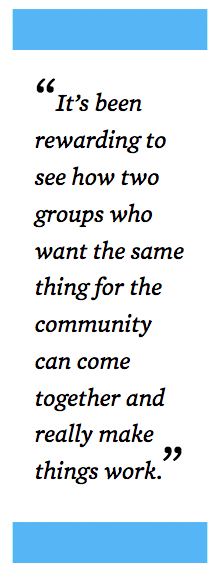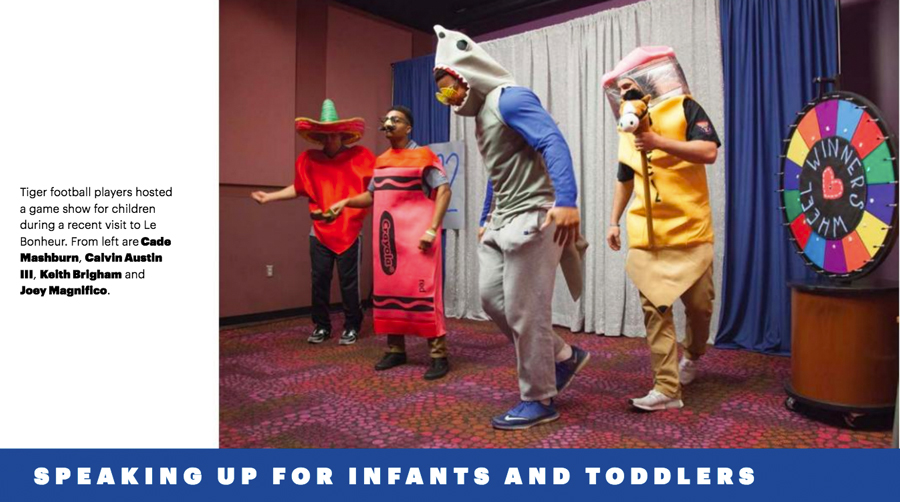
The University of Memphis has teamed with one of the region’s largest pediatric health
care facilities in Le Bonheur Children’s Hospital for several new and ongoing programs,
showcasing a model of how to use a partnership between a hospital and a university
to amplify the quality, efficiency and sustainability of existing and newly minted
initiatives.
“What we’ve built is a unique collaborative with the University involving multiple organizations coming together to meet the needs of our Le Bonheur patients,” says Gary Cook, director of Grant Administration with Le Bonheur.
Existing collaborations between the UofM and Le Bonheur include the Memphis CHiLD medical-legal partnership, the University-based Memphis Speech & Hearing Center (MSHC), and the LENA initiative geared toward pre-K readiness and improving communication between parents and their children.

The Memphis Children’s Health Law Directive, also known as Memphis CHiLD, is a first-of-its-kind for the region medical-legal partnership that began as a team effort between the UofM’s Cecil C. Humphreys School of Law, Le Bonheur and Memphis Area Legal Services. This interdisciplinary program brings together medical and legal professionals in an effort to better respond to legal issues facing patients and address some of the underlying social conditions that might have a negative impact on health.
“We saw a big need for something like this at Le Bonheur, knowing that a lot of our families have other needs that impact their health,” says Sara Burnett, public and community relations representative with Le Bonheur.
The initial goal of Memphis CHiLD was to look beyond the walls of the hospital toward the myriad of social determinants behind health, namely socioeconomic status and housing concerns. This is accomplished by pairing Le Bonheur families in need with UofM legal professionals to help out with various issues.
“Since they’re already Le Bonheur families, Memphis CHiLD provides a nonthreatening, known environment to discuss legal matters,” says Burnett.
Memphis CHiLD handles nearly 500 cases a year, dealing with a range of issues from taking landlords to task for housing improvements to rallying for previously denied supplemental income through Social Security for special needs children.
“The program is why I came to Memphis,” says Kathryn Ramsey, assistant professor of law and director of the Medical-Legal Partnership Clinic at the UofM. “I have been interested in medical-legal partnerships for a long time.”
Ramsey came to the UofM in fall 2018 after nearly a decade of working on issues of public interest law, expressing a marked interest in examining the nexus between legal problems and health issues in the Mid-South.
“It was clear for me the minute that I looked into the job that this is something that was very important and needed in the City of Memphis,” says Ramsey. “Given the high levels of poverty, particularly among children, in Memphis, this is an area where we really need to work to directly stabilize family situations and alleviate some of those negative social determinants of health that our clients experience.”
The UofM’s medical-legal partnership presents a dual-learning effort for both law students and local physicians by providing both parties a unique opportunity to practice alongside each other.
“The clinic offers a unique perspective,” says Burnett. “Attorneys in the program finally have a chance to interact with doctors and help break down some of those existing barriers in what was previously thought to be an adversarial relationship.”
The Research Center at Le Bonheur now hosts five offices dedicated to Memphis CHiLD in its lobby, allowing families to review cases directly on the hospital’s campus.

Another collaborative effort between the UofM and Le Bonheur is a relatively new partnership linking Le Bonheur’s existing network of patients with the state-of-the-art facility of the Memphis Speech and Hearing Center at the School of Communication Sciences and Disorders.
“The Memphis Speech and Hearing Center is now part of the Memphis-Le Bonheur family when it comes to continuity of care,” says Danielle Keeton, director of Outpatient, Rehab and Developmental Services at Le Bonheur. “That leads to better outcomes and easier access to services via internal referral, especially when it comes to things like hearing and language testing following a stroke or cochlear implant surgery.”
Since fall 2016, the UofM-based MSHC has operated under the Le Bonheur flag with the organization providing clinical oversight and revamping the center’s medical record-keeping system.
“We’ve agreed to both bring our own pieces of expertise and respect it on each side and make sure that anything we put together levels up the benefit for patients and families in the community,” says Keeton. “We’re really making sure that we’re not compromising any of the levels of quality that we need to maintain, but rather enhancing them by putting our services together.”
 For example, surgeons who perform cochlear implants are now backed by experts at Memphis
Speech and Hearing who know exactly how to care for patients post-implant to ensure
they access as much hearing as they can as soon as possible.
For example, surgeons who perform cochlear implants are now backed by experts at Memphis
Speech and Hearing who know exactly how to care for patients post-implant to ensure
they access as much hearing as they can as soon as possible.
“We didn’t always have access to that kind of expertise before this partnership,” says Keeton. The partnership is the brainchild of Dr. Linda D. Jarmulowicz, dean of the School of Communication Sciences and Disorders, who made the initial proposal and began to bring groups of administrators together to discuss institutional alignment in fall 2015.
“There were a lot of meetings between the two institutions to make sure we align our beliefs and ensure this would be beneficial for the University, the hospital and, most importantly, patients,” says Keeton.
In the lead-up and following the program’s September 2016 launch, Jarmulowicz worked alongside director of Speech Language Pathology Marilyn Wark, director of Clinical Services in Audiology Jennifer Taylor and Methodist Le Bonheur operations manager Sheila Climer to participate in monthly meetings with the operations team and clinic leadership to ensure educational components of the program are being met.
“Our partnership with the University brings clinical expertise that is cutting-edge, based on the latest research, and being published in new textbooks,” says Keeton. “That’s a huge benefit to Le Bonheur, because we’re constantly learning and challenging our own practices.”
For Keeton, a 2000 alumna of the UofM’s School of Communication Sciences and Disorders, being approached to head the project has felt like a second homecoming of sorts.
“The whole thing has felt like a bit of a coming-of-age project with the people I once asked for advice coming to me asking for advice,” says Keeton. “It’s been rewarding to see how two groups who want the same thing for the community can come together and really make things work.”
In addition to technology benefits on the University side, there are other ways patients can benefit from the MSHC-Le Bonheur union.
“Methodist Le Bonheur Health Care has a much larger variety of insurance companies that they contract with,” says Keeton. “We were able to help patients lower their own financial responsibly in some cases, so there’s a financial benefit to those patients who no longer have to be out-of-network with a clinic managing its own contracts.”

Further advancements in speech are made through the LENA program, a three-pronged approach to encouraging the ever-important connection between parents and children through age 3. The Language Environment Analysis (LENA) initiative represents a combined effort between the UofM, Le Bonheur, Porter-Leath and Agape Child & Family Services.
“Overall, LENA is designed to help study the use of language with young children,” says Sandra Madubuonwu, Maternal-Child director with LeBonheur Children’s Hospital.
LENA is broken down into three separate programs, each dealing with a different aspect of a child’s life: LENA Home, which focuses on home visitation; LENA Start, which is comprised of a series of parent-group classes; and the classroom-centric LENA Grow for early childhood educators. According to Madubuonwu, a wide net was necessary for the program to reach as many new parents in the Mid-South as possible.
“We are saturated,” she says. “We want to have the largest impact we can so the largest group can benefit from this.”
Memphis became the latest among a slew of new sites for the LENA initiative in fall 2017. The partnership was spearheaded by Dr. Loretta Rudd, clinical associate professor of Child Development, in conjunction with Seeding Success, a local nonprofit centered around childhood education initiatives. The UofM has currently implemented both LENA Home and LENA Grow programs.
“Dr. Rudd is the main coordinator between all our agencies,” Madubuonwu says. “We have one from each organization involved in addition to a ‘coordinator of coordinators’ sitting on the University of Memphis side.”
The crux of the LENA program involves attaching a small device, or “speech pedometer,” that records parents’ interactions with their babies for a short period of time each week. “It doesn’t actually record what the mom is saying,” says Madubuonwu, “but it does keep track of the number of words and interactions between a mother and child.”
The data from these devices is then used to track the process of language development and gauge the level of interaction between a parent and child.
“Every week, we receive a recording that shows the improvement in language development as their relationship and interaction with their mom progresses,” says Madubuonwu. “At the end of the year, we will report the outcome of this project.”
Le Bonheur currently has 25 pairs of mothers and children participating in the LENA program, with an overall goal of 50 more registered participants in 2019. Graduation from the program requires 10 uninterrupted sessions out of 30, with at least four of which being mandatory for program participation.
Early data from the Memphis-based initiative shows a graduation rate of 80 percent and improvements in several key areas, including a marked increase in adult caregivers speaking to the babies and nearly doubled language scores from program participants.
“The need is all over,” says Madubuonwu. “The necessity for this kind of program is not specific to a certain segment of society or culture. We are getting every one of these babies in the program ready for kindergarten.”
